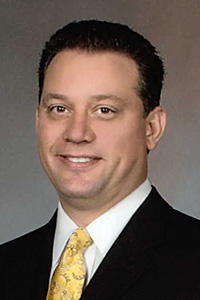LAKE FOREST, Calif. -- Faced with escalating fuel costs and declining Medicare revenues, the CEO of the country's 10th largest motor vehicle fleet decided to find out what Brown could do for him.
But Larry Mastrovich didn't contact United Parcel Service about its delivery services. Instead, he brought in Atlanta-based UPS' consulting arm to implement a brand new routing strategy for Apria Healthcare. The result is a new configuration of Apria's transportation system that is more efficient and effective.
"We've been able to see miles go down and are burning fewer gallons of fuel," Mastrovich said, though he wasn't prepared to share any numbers. "We've gotten a positive response from our customers as well."
The key to maximizing each driver's effectiveness in daily deliveries, he said, is to submit a plan for each day's routes by feeding data into the new UPS system the night before. The software then maps out a horseshoe pattern for the driver to follow that it estimates will save the most time and fuel, Mastrovich said.
"It arranges the addresses in an order that is most efficient," he said. "It loops around so that the last delivery is near the starting point. We used to do an up-and-down star pattern and ended all over the map."
The UPS system also takes a macro view of each territory, dividing it into four quadrants so that drivers focus on a specific part of town on different days. However, "if we need to jaunt off the scheduled route for a same-day delivery, we can always do that," Mastrovich said.
The new Apria system doesn't employ satellite-directed global positioning system technology. Instead, drivers have a Nextel radio phone that sends back signals so the system can track each vehicle's whereabouts and log each delivery.
"[The system knows] how many stops each driver has to make and every time a delivery is logged, it takes inventory out," he said. "It's not real time like GPS, but all phones have GPS chips. Implementing GPS is the next phase and it's only a matter of connectivity. We're taking it one step at a time."
Apria has implemented the system at each of its 19 centralized LCE (logistics centers of excellence) hubs across the country, each of which manages 150 to 200 routes. At the time Mastrovich spoke with HME News in mid April, the project was "90% complete," with Southern California still undergoing the transformation.
Indianapolis-based Medical Express Delivery is a courier company that specializes in logistics, and co-owner Brent Walsh agreed that sophisticated routing technology is critical to keeping a lid on the gas pump price tempest.
"The role of technology is growing evermore important," he said. "It is paramount for us to be able to effectively manage multiple drivers in several cities. We spent $60,000 last year to improve our technological infrastructure and software."
Medical Express Delivery doesn't use a GPS tracking system either because Walsh says "it isn't necessary yet." Instead, the courier service is concentrating on using dispatchers who specialize in geographic areas. Even though all dispatchers are centralized in Indianapolis, each one works a particular zone, so that drivers in Louisville and Lexington, Ky., have their own dispatcher, while northern, central and southern Indiana are directed by specialists in those areas, Walsh said.
"Because the dispatchers and drivers are accustomed to each other, there is a high level of trust and awareness between them," he said.




Comments